职高英语拓展模块 第五单元 Unit 5 Good Manners.wps 练习题
- 格式:wps
- 大小:67.00 KB
- 文档页数:4
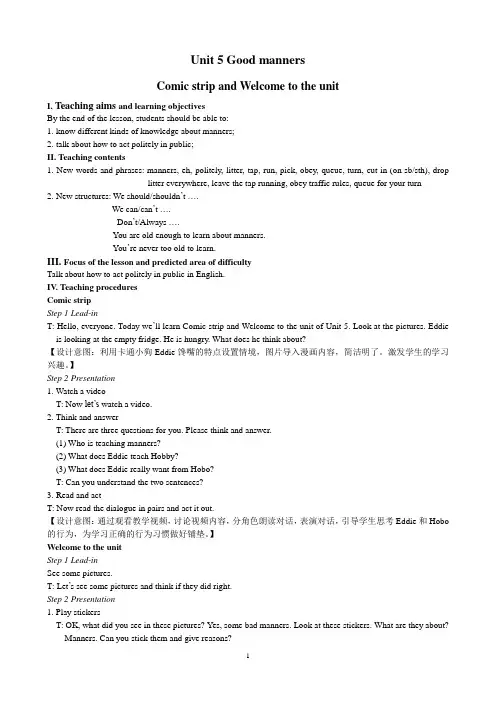
Unit 5 Good mannersComic strip and Welcome to the unitI. Teaching aims and learning objectivesBy the end of the lesson, students should be able to:1. know different kinds of knowledge about manners;2. talk about how to act politely in public;II. Teaching contents1. New words and phrases: manners, eh, politely, litter, tap, run, pick, obey, queue, turn, cut in (on sb/sth), droplitter everywhere, leave the tap running, obey traffic rules, queue for your turn2. New structures: We should/shouldn’t ….We can/can’t ….Don’t/Always ….You are old enough to learn about manners.You’re never too old to learn.III. Focus of the lesson and predicted area of difficultyTalk about how to act politely in public in English.IV. Teaching proceduresComic stripStep 1 Lead-inT: Hello, everyone. Today we’ll learn Comic strip and Welcome to the unit of Unit 5. Look at the pictures. Eddie is looking at the empty fridge. He is hungry. What does he think about?【设计意图:利用卡通小狗Eddie馋嘴的特点设置情境,图片导入漫画内容,简洁明了。
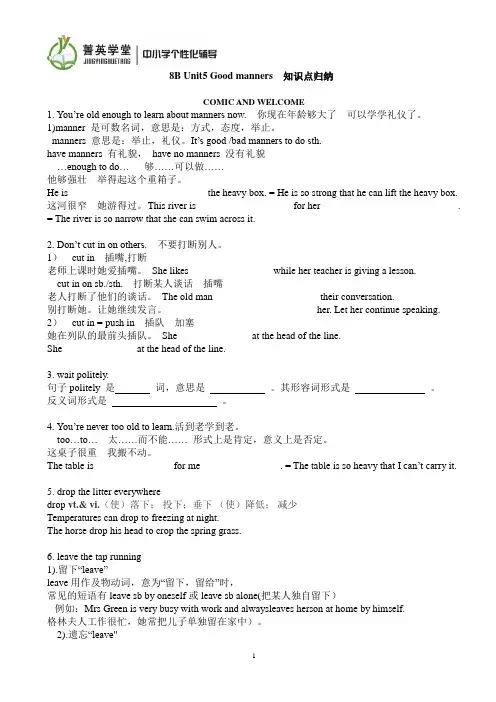
8B Unit5 Good manners 知识点归纳COMIC AND WELCOME1. You’re old enough to learn about manners now. 你现在年龄够大了 可以学学礼仪了。
1)manner 是可数名词,意思是:方式,态度,举止。
manners 意思是:举止,礼仪。
It’s good /bad manners to do sth.have manners 有礼貌,have no manners 没有礼貌…enough to do… 够……可以做……他够强壮 举得起这个重箱子。
He is ______ _______ ______ _______the heavy box. = He is so strong that he can lift the heavy box. 这河很窄 她游得过。
This river is ________ __________ for her _______ _________ __________. = The river is so narrow that she can swim across it.2. Don’t cut in on others. 不要打断别人。
1) cut in 插嘴,打断老师上课时她爱插嘴。
She likes __________ ______while her teacher is giving a lesson.cut in on sb./sth. 打断某人谈话 插嘴老人打断了他们的谈话。
The old man ______ _______ _______their conversation.别打断她。
让她继续发言。
_______ _______ ______ _______ her. Let her continue speaking.2) cut in = push in 插队 加塞她在列队的最前头插队。
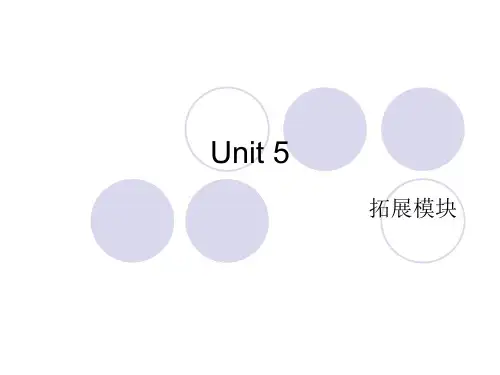
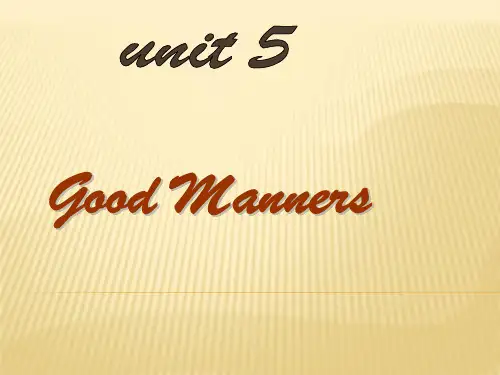
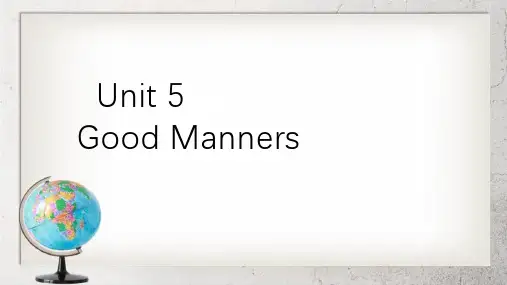
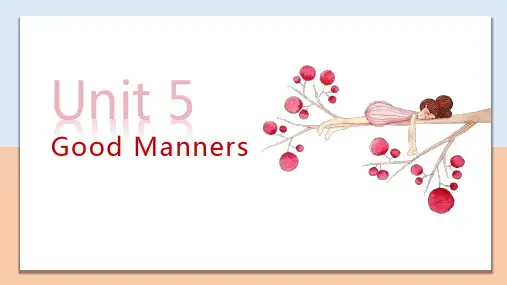

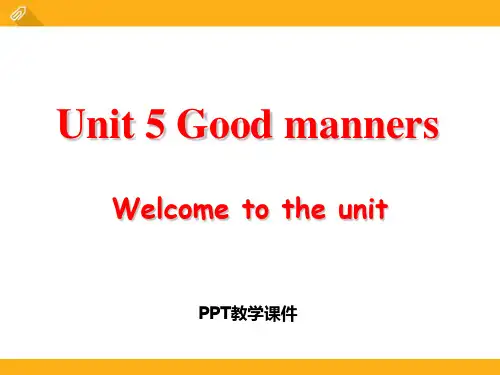
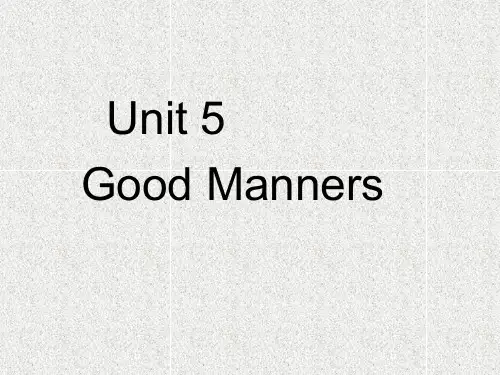
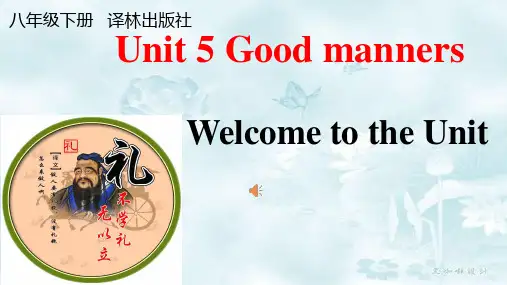
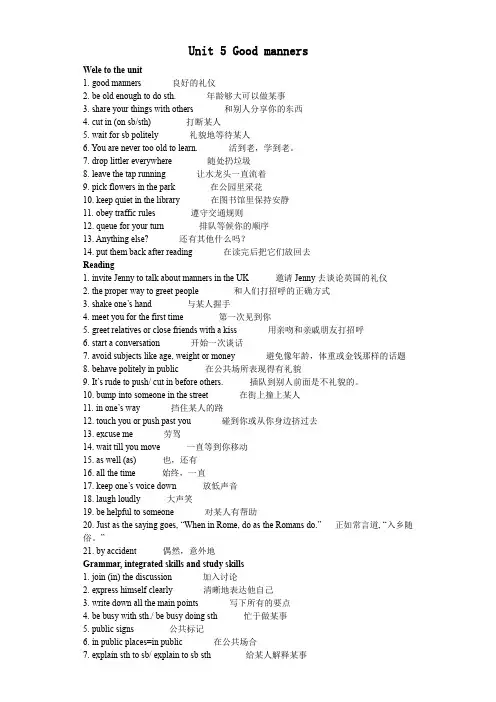
Unit 5 Good mannersWele to the unit1. good manners 良好的礼仪2. be old enough to do sth. 年龄够大可以做某事3. share your things with others 和别人分享你的东西4. cut in (on sb/sth) 打断某人5. wait for sb politely 礼貌地等待某人6. You are never too old to learn. 活到老,学到老。
7. drop littler everywhere 随处扔垃圾8. leave the tap running 让水龙头一直流着9. pick flowers in the park 在公园里采花10. keep quiet in the library 在图书馆里保持安静11. obey traffic rules 遵守交通规则12. queue for your turn 排队等候你的顺序13. Anything else? 还有其他什么吗?14. put them back after reading 在读完后把它们放回去Reading1. invite Jenny to talk about manners in the UK 邀请Jenny去谈论英国的礼仪2. the proper way to greet people 和人们打招呼的正确方式3. shake one’s hand 与某人握手4. meet you for the first time 第一次见到你5. greet relatives or close friends with a kiss 用亲吻和亲戚朋友打招呼6. start a conversation 开始一次谈话7. avoid subjects like age, weight or money 避免像年龄,体重或金钱那样的话题8. behave politely in public 在公共场所表现得有礼貌9. It’s rude to push/ cut in before others. 插队到别人前面是不礼貌的。
Unit5 good manners单词知识点详解:(comic—reading)1.manners n.礼仪you should learn about manners.2.cut in on sb 打断谈话don’t cut in on others3.politely adv礼貌地always wait politely4.litter n.垃圾don’t drop litter everywhere5.tap n水龙头turn on the tap. Don’t l eave the tap running.6.Run vi流动the sound of running water 逃跑run in all directions7.Pick vt采,摘pick flowers in the park pick up the paper 捡起8.obey vt 遵守,服从obey traffic rules you cannot fail to obey it.9.Queue vt 排队等候queue for your turn. A long queue 一条长队10.turn n.轮流it’s your turn to do sth 轮到你去take turns 轮流11.proper adj 符合习俗的,正确的the proper way to do sth 做某事的正确方法12.greet vt 问候greet sb warmly13.shake one’s hand 握手14.kiss vt 亲吻n 吻greet sb with a kiss==kiss sb15.close adj 亲密的close friends closely 紧密地(work closely with sb)16.conversation n 谈话start a conversation a private conversation17.avoid vt 避免avoid doing sth I always avoid meeting him.18.subject n话题avoid subjects like age, weight or money19.behave vt 表现behave politely in public behavior n.表现20.public n 民众,公众in public21.push vt 推,挤push in before others 再别人面前插队22.bump vi bump into sb 撞上某人23.in one’s way挡路on the way在途中by the way顺便说一下24.touch vt触碰don’t touch it.25.excuse vt原谅excuse me.26.till conj =until they will wait politely till you move.27.as well 也=too28.loudly adv shout or laugh loudly 大叫和大笑29.saying 谚语use English sayings 使用英语谚语30.Roman n. 罗马人when in Rome, do as the Romans do.短语默写(comic ---reading)1.good manners文明礼仪2.old enough to do sth.(年纪)足够大可以做。
Unit 5 G ood MannersI. 语音知识:从A、B、C、D四个选项中找出划线部分与所给单词划线部分读音相同的选项( ) 1. repeat A. tend B. event C. retell D. strange ( ) 2. doubt A.shout B. trouble C. touch D. enough ( ) 3. mutual A. rude B. funny C. full D. produce ( ) 4. sincere A. course B. chance C. cable D. contry( ) 5.chance A. children B. charactor C.chemistry D ChristmasII.单选( ) 1. We sometimes do or say something that may ______ other people.A. injureB. destroyC. hurtD. wound( ) 2. Making an apology may ______ a damaged relationship.A. mendB. repairC. helpD. perfect( ) 3. Are you familiar ______ some expressions for apologizing?A. toB. forC. ofD. with( ) 4. If you missed your friend’s party, you may say, “______”.A. You know I couldn’t make itB. I am so sorry for not being able to attend your party. I was very busy that day.C. It’s not my faultD. Pardon( ) 5. I am terribly sorry for that, please accept my ______ apology.A. goodB. sinceC. sincerelyD. sincere( ) 6. When you realize that you were wrong for losing your temper, you may say, “I apologize for my poor ______”.A. actB. thingC. attitudeD. temper( ) 7. When someone apologizes to you, you may say, “______”.A. I’m sorryB. It’s all rightC. Excuse meD. pardon( ) 8. He apologized not for having done something wrong, but for the inconvenience he ______.A. had causedB. had been causedC. would takeD. has done( ) 9. Chinese people and Japanese people usually feel ashamed ______ making apologies.A. byB. ofC. withD. for( ) 10. If you are not sure whether the person would accept your apology, you may avoid a ______ situation.A. back-to-backB. teeth-to-teethC. face-to-faceD. hand-to-hand()11. I’d rather ride a bike as bike riding has _____ of the trouble of taking buses.A. muchB. allC. neitherD. none()12. I need some blue ink today but there is _____ at hand.A. notB. nothingC. a littleD. none()13. - -May I help you with some trousers, sir?-Yes, I'd like to try those blue ____.A. oneB. onesC. pairD. two()14. We couldn't eat in a restaurant because _____of us had _____money on us.A. all; noB. any; noC. none; anyD. no one; any()15. ---Would you like some wine? ---Yes,just _____.A. littleB. very littleC. a littleD. little bit()16. There will be only _____small differences between the twins.A.few B.a few C.little D.a little()17. ---Have you a dictionary? ----Yes, I have a good ______.A. itB. someC. thatD. one()18. --- How many tigars did you see in the zoo?--- ________.A. NoneB. No oneC. NothingD. not some()19. Though it was very hot, there were still_______ people in the street.A. littleB. a littleC. fewD. a few()20. Sorry, I can’t answer your question. I know_______about the news.A. noneB. littleC. fewD. neitherIV. 完形填空:There are two men in important positions in my office –Mr. Thompson and Mr. White. Everyone enjoys working with Mr. Thompson, ___1___no one likes Mr. White.Mr. Thompson is always thoughtful and considerate. When he wants something___2___, he’ll ask “Would you mind getting this information for me, please?” Mr. White is just the ___3___. He usually shouts ___4___the room, “Get me this memorandum, and hurry up.”Mr. White surprised us this morning, though. At first we thought he must be sick. He was ___5___ and agreeable. “Miss Erickson,” he asked, “if it isn’t too much ___6___ for you, could you please make these telephone calls for me?” June Erickson was astonished. Right after that, Mr. White said, “Miss Reed, would you be so kind ___7___ open the window? It’s quite warm in here.” Then he talked to me. “I’d appreciate it very much if you’d mail these letters for me.”We couldn’t imagine why he was behaving so___8___. Should we offer him aspirins? Or had Mr. White changed his personality?The situation was soon cleared up. “Ladies,” Mr. Thompson said, “I’ve been ___9___that the president of the company will be here soon. He’s very interested in the welfare of his employees and will have some __10___to ask you about your working conditions here.”( ) 1. A. but B. and C. or D. still( ) 2. A. do B. done C. to do D. doing( ) 3. A. same B. another C. opposite D. other( ) 4. A. with B. for C. at D. across( ) 5. A. kind B. hard C. rude D. terrible( ) 6. A. question B. trouble C. problems D. difficulty( ) 7. A. in order to B. that C. as to D. and( ) 8. A. happily B. wildly C. funny D. strangely( ) 9. A. told B. said C. telling D. asked( ) 10. A. things B. questions C. problems D. troublesV. 阅读理解:AWhen meeting people, the way you dress, move, shake hands, and look at others can sometimes be more important than what you say.You should do as follows.Stand up when you are introduced to another person. Standing shows that you are interested in meeting the other person. Look directly at the person you are meeting.Shake hands with a strong, firm handshake. If you have gloves on, take them off. Reach your right hand out. Grip (紧握)the other person’s hand firmly. Do not crush (过于用力), please! Shake just once and let go. Do not hold the person’s hand for long. If your hands are dirty or wet, do not shake hands. Say “Sorry, my hands are dirty.”In formal situation there are special rules for introducing two people. For people in different ranks, you should introduce the subordinate (下属)to the superior (上级)first. Among equals, outside of work, you should introduce the younger person to the older one, and the male to the female. In a business office, people may be introduced by first and last names. At some work sites, male workers might use their last names only. At a party, people are often introduced by first names.Do not use business cards in social introduction. If you later talk about business, you can ask for the other person’s business card. It’s OK to write notes to help you remember details of the meeting on the back of the card.Look at the person you are talking to. Use the person’s name when you talk t o him or her. Find out what the other person is good at or likes to talk about. Avoid personal questions. Don’t ask their age, how much they paid for something, or how much money they earn. Don’t interrupt when someone else is talking. On the other hand, d on’t talk too long.Don’t whisper to keep another person from hearing your conversation. Don’t brag (吹牛)about yourself.( ) 1. According to this passage, ______ sometimes is not so important as ______.A. the way you dress….what you sayB. the way you shake hands…the way you dressC. the way you look at others…the way you dress, move and shake handsD. what you say… the way you dress, move, shake hands and look at others( ) 2. Which of the following should you do when you are introduced to anotherperson?A. Stand up, look directly at the person, and shake hands with a strong, firm handshake for longB. Look directly at the person, stand up and crush the person’s hand with a strong hand for just onceC. Stand up, look directly at the person, and shake hands with a strong, firm handshake for just onceD. Stand up, do not look directly at the person, shake hands with a strong, firm handshake. ( ) 3. When you are going to introduce a new employee and the boss to each other, you should introduce ______ first.A. yourself to the bossB. the employee to the bossC. the employee to yourselfD. the boss to the employee( ) 4. When you talk to John Benson, you should call him ______.A. Mr. BensonB. Mr. JohnC. SirD. Mister( ) 5. When you have dinner with Jack, Mary and Tom, and you want to talk to Mary, it is polite that ______.A. you talk to Mary loud enough so that the others can hearB. you ask Mary to come out to talk with youC. you talk to Mary in a low voice so that the others can’t hearD. you whisper to MaryBEveryone needs friends. We all like to feel close to someone. It is nice to have a friend to talk to, laugh with, and do things with. Surely, there are times when we need to be alone. We don’t always want people around. But we would feel lonely if we never had a friend.No two people are just the same. Sometimes friends don’t get along well. That doesn’t mean that they no longer like each other. Most of the time they will make up and go on being friends.Sometimes friends move away. Then we feel very sad. We miss them very much. But we can call them and write to them. It could be that we would even see them again. And we can make new friends. It is surprising to find out how much we like new people when we get to know them.Families sometimes name their children after a close friend. Many places are named after men and women who have been friendly to people in a town. Some libraries are named this way. So are some schools. We think of these people when we go to these places.There’s more good news for people who have friends. They live longer than people who don’t. Why? It could be that they are happier. Being happier helps you stay well. Or it could be just knowing that someone cares. If someone cares about you, you take better care of yourself. ( )6. The first paragraph tells us _________A.making friends is the need in people’s lifeB.no one needs friendsC.we need to be aloneD.we always need friends around us( )7. Which of the following is what the writer doesn’t say in the passage?A.People are not happy when their friends leave them.B.People can know their friends in different ways.C.People need foreign friendsD.People like their friends very much if they get to know them.( )8. Which of the following is most probably the place people name after friendly people?A. A city.B. A room.C. A town.D. A library.( )9. People who have friends live longer than people who don’t because ________.A. they feel happier and healthyB. they get a lot of help from their friendsC. they take better care of themselvesD. both A and C( )10. The main idea of the passage is ________.A. that people are all friendsB. that people need friendsC. how to get to know friendsD. how to name a place。